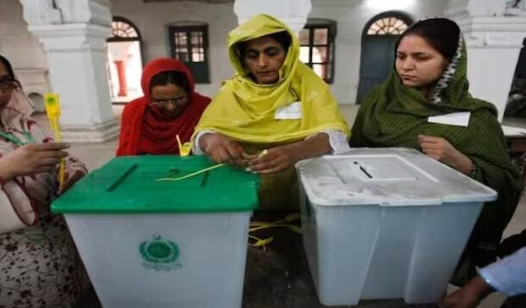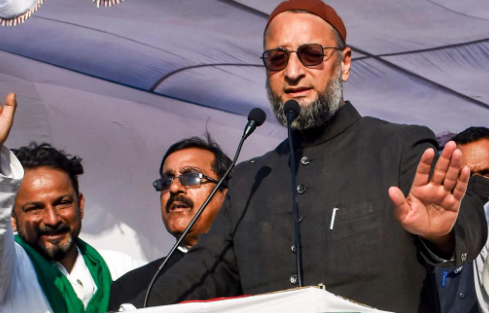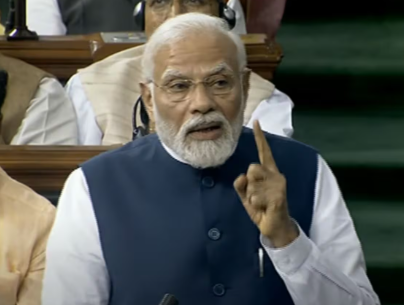
PM Modi Assertive Remark in Rajya Sabha: ‘Aisa Mauka Phir Kahan Milega’ – Seizing Opportunities with Confidence
PM Modi Resolute Challenge to Mallikarjun Kharge in Rajya Sabha: Seizing a Rare Opportunity
In a recent session of the Rajya Sabha, Prime Minister Narendra Modi took a pointed dig at Mallikarjun Kharge, the Congress leader in the upper house, in response to Kharge’s bold assertion of achieving “400 paar” (over 400 seats) in the upcoming Lok Sabha elections. Modi’s swipe was not merely a reaction to Kharge’s ambitious claim but also a reference to Mamata Banerjee’s recent prediction that the Congress might not secure more than 40 seats in the 2024 polls. With a touch of irony, PM Modi remarked, “I pray that you keep 40 seats with you,” subtly implying skepticism about the Congress’s electoral prospects.
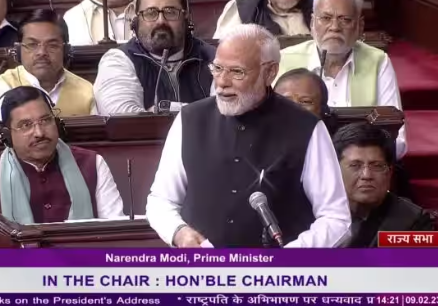
Characterizing Mallikarjun Kharge as a source of amusement in the Rajya Sabha, PM Modi quipped, “As I listened to his speech, I wondered how he got the freedom to speak so boldly.” He further mused on Kharge’s adeptness at seizing opportunities, likening it to a cricketer scoring boundaries and sixes when the opposing team’s key players are absent. The phrase “aisa mauka phir kahan milega” (when will such an opportunity come) encapsulated Modi’s portrayal of Kharge’s rhetorical flourish as a calculated move in the political arena.
PM Modi remarks did not solely target Kharge’s rhetoric but extended to critique the Congress party’s historical legacy and recent actions. He admonished the Congress for its inconsistency in leadership and ideology, juxtaposing it against his government’s stability and clarity of vision. Modi questioned the Congress’s penchant for conferring Bharat Ratna, India’s highest civilian honor, upon family members, suggesting a pattern of nepotism and self-aggrandizement within the party’s ranks. He lamented the Congress’s failure to prioritize national interests over dynastic considerations, citing examples such as the naming of roads and the timing of the annual Budget announcement.
Unraveling a thread of historical inquiry, PM Modi probed into the Congress’s colonial legacy, questioning its reluctance to shed vestiges of British influence. He challenged the party’s adherence to traditional practices and symbols, proposing alternative narratives and commemorations that reflect India’s cultural heritage and national identity. By juxtaposing “Rajpath” (King’s Way) with “Kartavya Path” (Duty Path) and critiquing the timing of the Budget announcement, PM Modi sought to reframe historical narratives and assert a nationalist agenda.
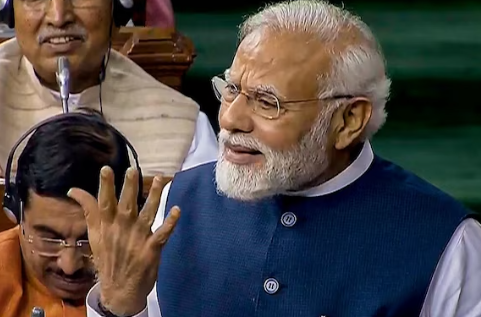
In essence, Modi’s remarks in the Rajya Sabha transcended mere political banter, offering a critique of the Congress’s ideological bankruptcy and historical inertia. His invocation of cricketing metaphors and rhetorical questions underscored a shrewd political acumen, while his historical inquiries signaled a broader ideological contestation. As India braces itself for the 2024 Lok Sabha elections, PM Modi words serve as a reminder of the stakes involved and the competing visions of India’s future.
PM Modi critique of the Congress’s leadership and policies extended beyond rhetorical flourishes to highlight broader questions about the party’s commitment to national interests and inclusive governance. He contrasted the Congress’s legacy of dynastic politics and tokenism with his government’s emphasis on meritocracy and development-driven governance.
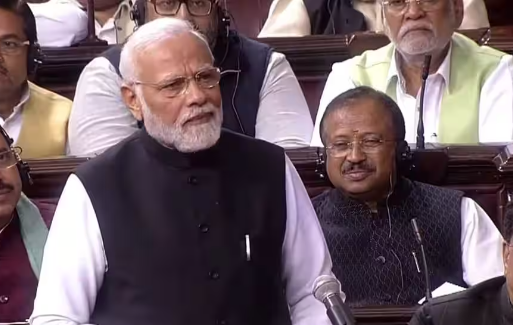
By questioning the Congress’s decision-making processes during its rule, PM Modi raised concerns about the party’s lack of strategic vision and its tendency to prioritize personal or familial interests over the welfare of the nation. He pointed out inconsistencies in the Congress’s approach to economic policies, highlighting the party’s failure to make decisive choices between nationalization and privatization, which may have contributed to economic stagnation and missed opportunities for growth.
Moreover, PM Modi remarks underscored a broader narrative about the need for historical reassessment and cultural rejuvenation. He challenged the Congress’s adherence to colonial legacies and Western-centric perspectives, advocating for a reclamation of indigenous identities and values. By proposing alternative names for landmarks and questioning established practices, PM Modi sought to initiate a dialogue about the significance of cultural authenticity and historical memory in shaping India’s collective identity.
For the latest updates-click here.

